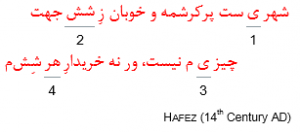a. Determiners
A determiner (category symbol: D) is a grammatical morpheme that appears as a constituent in phrases to determine their identifiability or quantity. Unlike adjectives, determiners do not have the degree category:
The constituent which is expanded by the determiner is called the determinative focus.
In Persian, determiners can be noted in the syntax of the following phrases (which are also-called determiner phrases):
- Noun phrases (= nominal determiner phrases): [NP[Din] [Nkeʃvær]] این کشور
- Adjectival phrases (= adjectival determiner phrases): [AP[Dbesjɒr] [Abozorg]] بسیار بزرگ
- Composed Adpositions (= adpositional determiner phrases): [P[Dhæm-] [Pʧon]] همچون
- Determinative phrases ↓ (= determinative determiner phrases): [DetP[Dhæm-] [Din]] همین
As noted in these examples, there are both free and also clitical determiners.
b. Determinative Phrases
Determinative phrase (category symbol: DetP) is the genus for the language elements which appear as constituents in phrases to determine their identifiability or quantity. They can be classified in Persian as follows:
- Articles. They are used to determine the definiteness of noun phrase (see 3•۲.):
دید شخصی فاضلی، پرمایهای
آفتابی در میانِ سایهای
Rumi (13th Century AD)
- Counting numerals are used mainly as determinative phrases. They can generate numeral phrases with noun phrases:
پنج سرباز [NP[DetPpænʤ] [NPsær-bɒz]]
سه کیلو گوشت [NP[DetPse kilu] [NPguʃt]]
Additionally, measure word numerals including the following items belong to this group:
- /færsænghɒ/ فرسنگها in /færsænghɒ rɒh/ فرسنگها راه (see 6•۱•۴•a)
- /dæm-i/ دمی in /dæm-i sæbr/ دمی صبر (see 6•۱•۴•a)
- /bæs-i/ بسی in archaic idioms (see 6•۱•۴•a):
اندر این شهر بسی ناکس بر خاستهاند
همه خرطبع و همه احمق و بیدانش و دند
Labibi (10th and 11th Century AD)
In archaic idioms, of Persian, /bæs/ بس, /besjɒr/ بسیار and /færɒvɒn/ فراوان are used like counting numerals as determiners with noun phrases in the singular:
کارِ بیعلم بار و بر ندهد
تخمِ بیمغز بس ثمر ندهد
Sanai (11th and 12th Century AD)
بسیار سفر باید، تا پخته شود خامی
صوفی نشود صافی، تا در نکشد جامی
Saadi (12th and 13th Century AD)
فراوان پرستنده پیشش به خاک
زِ زربفت پوشیده مکّیقبای
Ferdowsi (10th and 11th Century AD)
In this case, /bæs/ بس can also become the determinative focus of exclamative phrases /æj bæs-ɒ/ ای بسا, /bæs-ɒ/ بسا and /æj bæs/ ای بس (see 7•۱۵•c.):
ای بسا ابلیسِ آدمرو که هست!
پس به هر دستی نشاید داد دست
Rumi (13th Century AD)
خندهیِ جامِ می و زلفِ گرهگیرِ نگار
ای بسا توبه که چون توبهیِ حافظ بشکست!
Hafez (14th Century AD)
بسا عقلِ زورآورِ چیردست
که سودایِ عشقش کند زیردست!
Saadi (12th and 13th Century AD)
بسا تلخعیشان و تلخیچشان
که آیند در حلّه دامنکشان
Saadi (12th and 13th Century AD)
غرّه مشو بدآن که جهانت عزیز کرد!
ای بس عزیزکردهیِ خود را که کرد خوار
Omara Marvzi (10th Century AD)
ای بس شهِ پیلافکن کهافکنـد به شه پیلی
شترنجیِ تقدیرش در ماتگهِ حرمان
Khaqani (12th Century AD)
- In Persian (unlike most other Indo-European languages), ordinal numerals are also used as Determinative phrases, like:
- /pænʤomin/ پنجمین in /pænʤomin ruz/ پنجمین روز
- /ɒxærin/ آخرین in /ɒxærin færmɒn/ آخرین فرمان
- Adjectival phrases in the superlative are used in the determinativized form in Persian: /bozorgtærin sæbæd/ بزرگترین سبد, /gerɒntærin kæfʃ/ گرانترین کفش
- /tænhɒ/ تنها, /jegɒn/ یگـان and /jegɒnæ/ یگانه. The generated determiner phrase represents the only element of the superset:
تنها فرزندِ خود را در جنگ از دست داد.
یگـان کاری که برایم مانده زاریست.
یگانه دخترش را به خانهیِ شوهر فرستاد.
- Determinative phrases to the gradation of adjectival phrases (see 4•d.), including:
- /nesbætæn/ نسبتاً in /nesbætæn særd/ نسبتاً سرد
- /ændæk-i/ اندکی in /ændæk-i bishtær/ اندکی بیشتر
- Various pronouns, including:
- /in/ این in /in kudækɒn/ این کودکان
- /ʧe/ چه in /ʧe sud/ چه سود
- /folɒn/ فلان in /folɒn ruz/ فلان روز
c. Nominalization of Determinative Phrases
(See 6•۱•d. Nominalization of Counting Numerals and 7•۶•c. Nominalization of Demonstrative Pronouns.)
If the determinative phrase is a counting numeral or a pronoun, encounters the scenario where its determinative focus is deleted. In this case, the determinative phrase is nominalized because it is the only constituent of the determiner phrase.
This deletion can be noted in the following cases:
- Proximate redundancy: If the entity referred to by the determinative focus has recently been mentioned:
او سه پسر دارد. هر سه [NP[DetP/se/]] (= هر سه پسر [NP[DetP/se/] [NP/pesær/]]) دانشجو هستند.
من دیروز کتابی خریدم. امروز نمیتوانم آن [NP[DetP/ɒn/]] (= آن کتاب [NP[DetP/ɒn/] [NP/ketɒb/]]) را پیدا کنم.
- Obviative redundancy: If the entity referred to by the determinative focus has not recently been mentioned, but the listener knows what it is, or the attention of the listener is called upon simultaneously:
دو تا [NP[DetP/do tɒ/]] (= دو تا انسان [NP[DetP/do tɒ/] [NP/ensɒn/]]) داشتند در بارهیِ بچّگیشان با هم گپ میزدند.
این [NP[DetP/in/]] (= این چیز [NP[DetP/in/] [NP/ʧiz/]]) را ببین!


